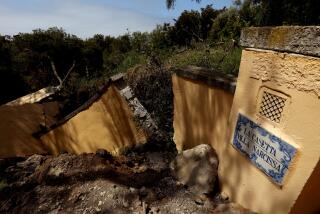Drought threatens future of center for developmentally disabled
Julie Hill was born with a captivating smile and a sense of wonder. She was also born with developmental disabilities and beset with orthopedic struggles that required numerous surgeries. Her father likes to say that he was blessed with an eternal 5-year-old who loves him unconditionally, but he faced a long road too. Twelve years ago, when Julie moved into the Los Angeles Residential Community, he struck gold.
LARC Ranch was founded in 1959. It was never going to be a simple proposition to carve a campus for developmentally disabled adults out of the unforgiving hills, certainly not on an underwhelming budget. But the result was magic, said Julie’s father, Edwin Hill.
The place just works, he said, with a tireless staff that finds creative ways to keep residents active and healthy — asking them to design the table centerpieces for fundraisers, or purposely mixing lower- and higher-functioning residents in the same villa, providing intellectual stimulation for all.
“They are the most caring, giving, loving people here,” Hill said.
Then, it forgot to rain. Now, after all these years, LARC needs a real miracle.
Earlier this year, LARC’s wells started to sputter, and today, they have run dry. The aquifer beneath Bouquet Canyon appears to be empty.
LARC’s 65-acre campus is three miles from the nearest municipal water pipes, and the cost of connecting has been quoted at more than half its annual budget.
Its remote location and reliance on underground water has left LARC particularly vulnerable as the state suffers through one of its worst droughts in decades. Creativity and hope are watchwords.
The facility is hoping to persuade government officials to release water from a nearby reservoir that would flow down a creek and, in theory, into the aquifer. But refilling the underground reserve could take years and, regardless, that initiative has become mired in red tape.
LARC has resorted to trucking in water bought from the city of Santa Clarita — 1.4 million gallons to date, enough that some days a convoy of trucks rumbles up the dusty access road to the facility’s water tank. But that is getting expensive and is viewed as, at best, a short-term solution.
There does not appear to be a long-term solution, nor the promise of rain, on the near horizon.
“We’re talking about water,” said Charles Sturkey, LARC’s director of operations. “The only analogy I can think of is that you’re on a road trip and you’re the farthest point from home, and your engine blows. It’s completely unexpected. And it is an immediate need.”
What will happen if the money runs as dry as the aquifer?
“I haven’t even gone there yet,” said Executive Director Kathleen Sturkey, who is married to Charles. “We’re fighters. We’re trying so hard. So far, the residents don’t know — their life hasn’t changed. To give up on them would be terrible. There’s got to be a way. But we need help.”
LARC was founded by parents who sought to build a campus where their children, many of them beset with severe developmental disabilities, could live in a safe, nurturing environment.
They bought a former ranch property near Saugus, and LARC eventually became the largest facility of its kind in the Santa Clarita Valley.
Today, the campus serves 103 full-time residents, who live in 13 small villas, as well as 80 day-program clients. It is enough of an institution that LARC has celebrated four weddings between residents, Kathleen Sturkey said.
When the aquifer ran dry, LARC administrators initially hoped an infusion of reservoir water would flood Bouquet Creek and refill the aquifer. But tapping into that supply was no simple matter.
Bouquet Creek runs parallel to a popular route for motorists traveling between the Antelope and Santa Clarita valleys. Over the years, debris and sediment have accumulated in the creek, which in some cases is now higher than the road. Releasing water from the reservoir into the creek would probably flood the road.
A solution, said Edel Vizcarra, Supervisor Michael D. Antonovich’s planning and public works deputy, would be to dig out the creek. The county recently approved Antonovich’s local state of emergency request to expedite the work.
“We have the equipment. We have the crews. We have the funding,” Vizcarra said. “We’re ready to clean that thing out tomorrow.”
The creek and the road, however, are on U.S. Forest Service land. The federal government is required to demand intensive studies and environmental reviews before the work could begin, a process that could take a year or more, Vizcarra said. A separate proposal to raise the grade of the road is bogged down in a similar multiagency tangle.
“This is not going to be a quick fix,” Vizcarra said.
LARC has looked into digging pipes to tap into Santa Clarita’s municipal water supply, but that would also be a long project and could cost as much as $3 million, Kathleen Sturkey said. LARC’s annual budget varies but is typically $4 million to $5 million, she said.
LARC is on pace to spend about $150,000 trucking in water this year.
“Our budget is always a little iffy,” said Edwin Hill, a retired ophthalmologist who is a LARC board member. “We’ve got our backs up against the wall.”
It is a harrowing situation for parents such as Hill and his wife, Claire L. Rothman, a LARC board member who is the former general manager and president of the Forum. For now, Hill and Rothman press on, regularly visiting Julie, who is 49.
On a recent morning, Julie maneuvered her wheelchair to greet them at the door of her villa. Offering a broad smile and hugging them both, she showed off some of her recent work — drawings in a children’s coloring book and a colorful beaded necklace she had strung.
“You look very lovely,” Rothman told her.
Hill and Rothman marvel at the progress Julie has made. On one recent visit home, a neighbor dropped by and brought Julie some candy. She reported: “That new boy brought me candy to take back to the ranch tomorrow.”
“That’s the longest sentence I’ve heard her say in a long, long time,” Edwin Hill said.
When it was time to leave, Julie blew them a kiss.
“I’ll be home,” she reassured them. “Have fun.”
Twitter: @scottgoldLAT
More to Read
Sign up for Essential California
The most important California stories and recommendations in your inbox every morning.
You may occasionally receive promotional content from the Los Angeles Times.











